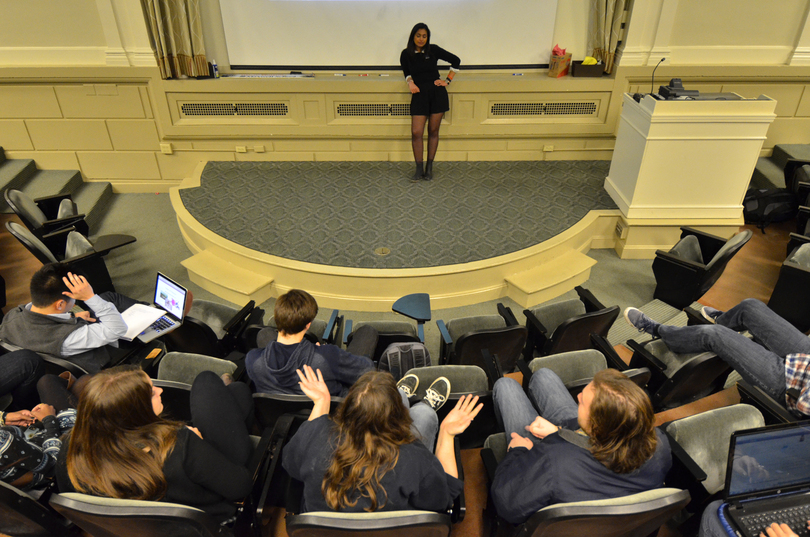SA debates including the race of suspects in DPS public safety notices

SA president Aysha Seedat leads a discussion about including race and ethnicity in DPS public safety notices on Monday night. SA also officially took a stance to support bringing Uber to Syracuse. Chase Guttman | Asst. photo editor
During a public safety town hall meeting at Syracuse University on Monday, Department of Public Safety Chief Bobby Maldonado discussed whether it would be appropriate for DPS to include ethnicity and race in suspect descriptions in its public safety notice emails.
The discussion was prompted by Student Association President Aysha Seedat, who thought to ask Maldonado about the issue after reading a letter to the editor published by The Daily Orange on Oct. 28. The author of the letter, Matthew McReynolds, a Class of 2016 master of public administration candidate, argued that if DPS were to include ethnicity in its descriptions, it would “greatly improve the likelihood that the perpetrator might actually be identified and apprehended.”
At SA’s Monday night meeting in Maxwell Auditorium, Seedat sought the assembly’s thoughts on the issue, sparking a roughly 30-minute discussion. Additionally, the assembly voted to officially take a stance to support bringing Uber, a ride-hailing service, to Syracuse.
The Jeanne Clery Act, a federal law signed in 1990, requires all colleges and universities that receive federal funding to disclose information about crimes that occur on and near campus. However, it does not require schools to include ethnicity or race in suspect descriptions.
DPS stopped including suspects’ races in public safety notices in March 2013 after a group of multiracial students complained to former DPS Chief Tony Callisto, who is now SU’s senior vice president and chief law enforcement officer, and Thomas Wolfe, then-senior vice president and dean of SU’s Division of Student Affairs, according to a Syracuse.com article. The students said they felt marginalized and said the notices often described the suspect as being “a young black male in a hoodie,” according to the article.
When Seedat asked assembly members for their opinions on the subject, the responses were mixed. Some members felt that disclosing a suspect’s race would help identify the suspect, while others were skeptical and worried that it could lead to issues of racial profiling. Callisto said in the Syracuse.com article that the racial descriptor hadn’t helped DPS identify suspects.
Seedat said the issue isn’t something the assembly will necessarily take a stance on and that she simply wanted to gauge the assembly members’ feelings on the matter on Monday.
Later in the meeting, the discussion turned to Uber and a letter that SA may send to the New York State Assembly and Senate requesting that the state change its laws so ride-hailing services, such as Uber, would be legalized in the city of Syracuse.
The assembly did not vote on whether it would approve the letter, which was drafted by Seedat, but it did vote to take a stance supporting the legalization of Uber in Syracuse. Currently, ride-hailing services are illegal in New York state, with the exception of New York City.
Before next week’s meeting, Seedat said she will be making minor edits to the letter. The assembly will then vote to either approve or disapprove sending it to the New York State Assembly and Senate.




